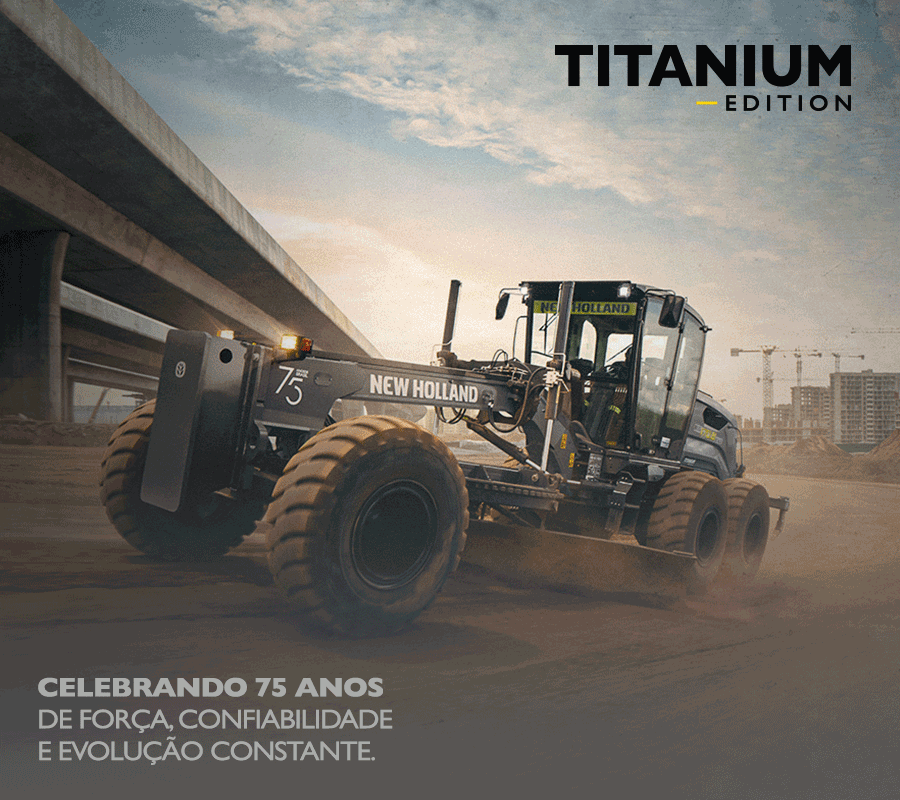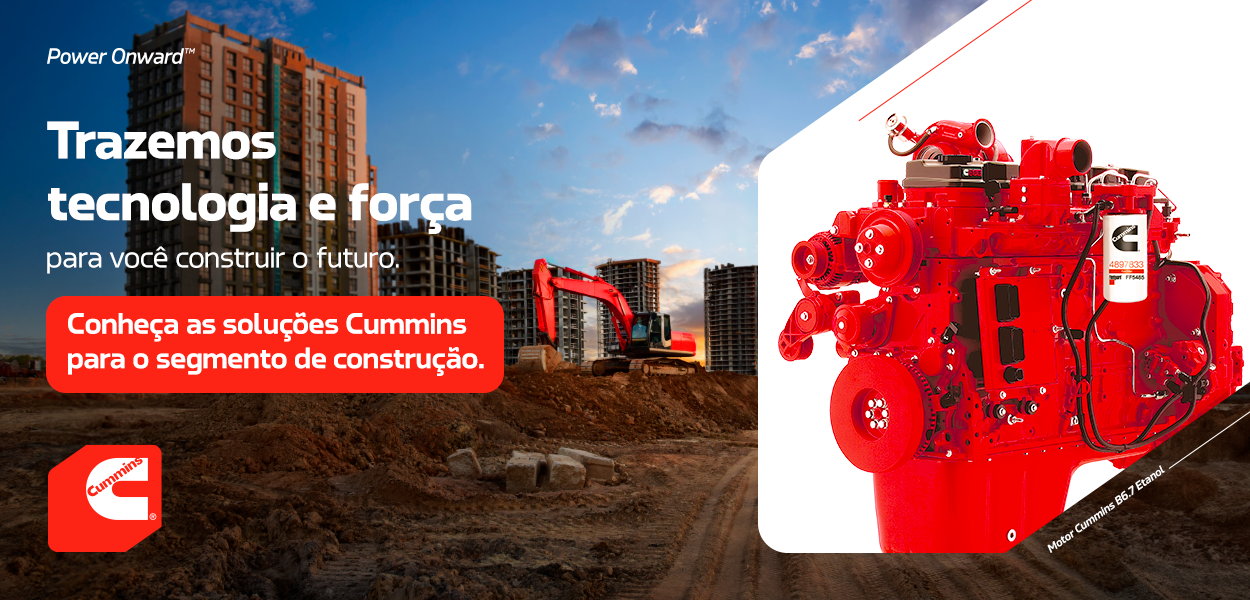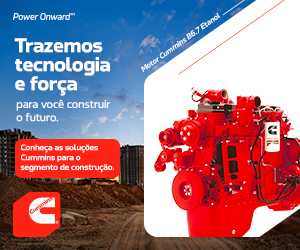New manufacturers debut on the Brazilian market
U.S. manufacturers John Deere and LBX, China’s Shantui and Zoomlion and Europe’s Ammann and Bomag spark even more competition in the market upon announcing plans to produce locally
 The Sobratema study of the Brazilian market for construction equipment, released annually in mid-November, revealed in its latest edition that 29% of the nearly 30,000 units of earthmoving equipment sold in Brazil are imported. Much of this volume is associated with manufacturers that have production lines in the country, but who complement their product portfolios with the importation of certain models for which there is lower demand and, therefore, do not justify being produced locally.
The Sobratema study of the Brazilian market for construction equipment, released annually in mid-November, revealed in its latest edition that 29% of the nearly 30,000 units of earthmoving equipment sold in Brazil are imported. Much of this volume is associated with manufacturers that have production lines in the country, but who complement their product portfolios with the importation of certain models for which there is lower demand and, therefore, do not justify being produced locally.
According to what reporters for M&T magazine were able to gather during the M&T Expo 2012 trade show, this percentage may remain stable or even increase in the coming years. With the arrival of new players that have announced investments in factories in Brazil, what is actually expected to grow considerably is the number of models produced locally. In addition to cases that have already been widely announced by the press (such as factories being built by Hyundai, Doosan, Sany and XCMG), other companies reinforce the chorus of new competitors who are willing to invest in local production.
M&T Expo 2012 helped to identify this scenario more accurately. Of the 494 companies present at the trade show, 170 were exhibitors new to the show and without operations in the country. Among other companies, the list included U.S. companies John Deere and LBX Excavator, Chinese manufacturers Shantui and Zoomlion and Europe’s Ammann and Bomag, all with plans to set up factories in Brazil.
Deere’s plans
The John Deere Company for example, which already has a significant share of the market for agricultural machinery, and production of some models in Brazil, announced investments of US$ 180 million to build two construction equipment manufacturing plants in the country. One of these units will be dedicated exclusively to the production of hydraulic excavators in a partnership with Japan's Hitachi, which will be responsible for US$ 56 million of the total estimated investment.
The other industrial plant, controlled exclusively by John Deere, will be assigned to the production of backhoes and bucket loaders. According to Roberto Marques, sales manager for the company, the two factories will be built in Indaiatuba, a city in the interior of São Paulo state, and will go into operation by the end of 2013. Meanwhile, the company will start its operations in Brazil with the importation of models produced in the United States.
The company plans to compete in other segments of the market, such as graders and bulldozers, but only with imported models. Its priority now is to structure the distribution network and customer service, aiming to cover 92% of the Brazil’s territory. “The network of dealers which is being assembled will not depend exclusively on the groups that already serve the brand in the agricultural area,” said Marques.
New models
For strategic reasons, the executive avoids revealing details about the dealer network that is in the structuring phase. But he did announce that the dealer responsible for the area of Minas Gerais is the Inova Group, which already handles the distribution of the brand’s agricultural machinery and of Volvo trucks. Marques explains that, worldwide, the company has some dealers that serve both the agricultural and construction sectors, but with separate, distinct operations “since these two markets are different and also have different demands, which require specialization and focus.”
According to the executive, participation in M&T Expo 2012 allowed the company to make its introduction in a grand style to the Brazilian market through direct contact with customers so as to listen to their needs. During the event, the company featured its 310K backhoe which will probably be produced in Brazil, equipped with front bucket with a capacity of 1 m³ and with an option for back bucket of 18, 24 or 30 inches. The machine has 80 HP and can be configured with 4x2 or 4x4 wheel drive and a cab equipped with ROPS / FOPS protection, depending on the user's choice of option.
Another family of equipment that was highlighted by John Deere were shovel loaders. The company is offering five models in the range 146 to 246 HP, with buckets from 2.1 to 3.6 m³ capacity, respectively. They have a load-sensing hydraulic system that provides the necessary flow for smooth-running and simultaneous functions, providing faster work cycle times with lower fuel consumption. In addition, they feature a Powershift transmission which provides automatic adjustment of gear meshing so as to protect the assembly from incidental ‘jarring’ during operation.
To compete in the segment of hydraulic excavators, John Deere will offer four models with capacities of 16 tons, 21 tons, 25 tons and 35 tons, equipped, respectively, with 121 HP, 159 HP, 188 HP and 271 HP engines. In addition to these excavators, which will be produced in the city of Indaiatuba (SP), the line may be supplemented with other imported models. Marques points out that the locally manufactured models will be marketed under the John Deere and Hitachi brands. Those marketed under the John Deere brand will be fitted with John Deere engines and Hitachi brand models will come equipped with Isuzu technology engines.
LBX’s Bet
U.S. manufacturer LBX Excavator is another company that is betting on the strength of its brand to gain a significant share of the Brazilian market. The company, which belongs to Japan’s Sumitomo Group, devotes itself exclusively to the production of Link-Belt brand hydraulic excavators - one of the most traditional brands in North America. “To serve the needs of Brazilian users, we will have four models with 13 tons, 16 tons, 21 tons and 35 tons of operating weight,” says Edward Gerber, general manager for LBX for the area of international business.
According to the executive, the brand is already known in Brazil, so the company is betting it can gain market share among the country’s “first line” customers, i.e. those who demand equipment with a high level of embedded technology and a focus on increasing productivity. “We want to conquer 10% of the Brazilian market for excavators in the next two years and proof of how important we consider this endeavor to be is the presence of our company’s senior global executives at M&T Expo 2012,” says Gerber.
He refers mainly to the fact that the President of LBX worldwide, Chuck Martz, personally attended the event to have direct contact with local customers. Much attention has been devoted to building the company’s network of dealers, which should consist of 10 partners to cover most of the country. “We have already appointed four, and in Rio Grande do Sul we are relying on the experience of Tauron, a renowned company that has distributed Terex equipment for many years,” says Gerber.
Shantui Advances
Another international manufacturer that intends to put down roots in Brazil is the China’s Shantui. The company has at its disposal the land of a farm which belongs to the current president of Shantui in Brazil, Julio Gonzalez-Reyes, in the city of Presidente Prudente (SP) where the executive intends to establish a plant to manufacture construction equipment. According to Gonzalez-Reyes, there is also a budget of US$ 120 million that the company’s world headquarters has made available for investment in Brazil.
“With these financial resources, we will initially install a unit for assembling the equipment and, within three years’ time, we will have a factory capable of providing a degree of local content above the rate required to qualify for FINAME financing,” he says. Currently, the company is setting up the administrative office at the same location. “This was the first step after we formally established Shantui in Brazil last September, consolidating a commercial relationship that the brand already had with several Brazilian construction companies which purchased our equipment,” adds the executive.
Despite being known in Brazil for its family of crawler tractors, Shantui is betting on the commercialization of its full line of equipment, which includes machines ranging from excavators, loaders and roller compactors to concrete pumps, concrete mixer trucks, drilling rigs and forklifts, among others. To do so, the company is building a network of distributors willing to commit to prioritizing the company’s brand. “Our dealers will have to work hard for Shantui, because only then can they better exploit the competitive potential of our equipment,” says Reyes.
Presently, Shantui does not have distributors to serve customers in Brazil, but it does have the support of a few local dealerships. According to the executive, this group, consisting mainly of smaller companies, may serve as an embryo for the establishment of the network over the next six months. Reyes includes in this roster of resellers none other than Brasil Máquinas de Construção (BMC - Brazil Construction Machinery), which does not fit the profile of a small company, but which has been marketing the brand’s products for some years.
Globally, Shantui ranks 19th among the largest manufacturers of equipment, according to Dave Lightle - global senior consultant for communications at the company. “In the segment of track-type tractors, we hold over 60% of the Chinese market, which is the largest in the world,” he adds.
Swiss Technology
In line of equipment for roadway construction, emphasis at M&T Expo 2012 was placed on the arrival of two European competitors who were already known among Brazilian equipment users, but are now preparing to establish factories in the country: Ammann of Switzerland, and Bomag of Germany (a company which is controlled by France’s Fayet Group). According Gilvan Pereira, director for Ammann Latin America, the results obtained in one year of operation in Brazil led to this strategy. “During this period, we sold over 100 roller compactors,” he says.
The project for the new plant, which goes into operation by the end of this year, is expected to consume investments of € 9 million, but Gilvan avoids revealing its location. “The company became known in the local market through the initiatives of Commingesoll, a distributor, and now we are working on extending this network to cover the entire national territory.” CHB Equipment has already assumed this role in the state of Minas Gerais and other dealers are being named for the country’s Northeast and South regions.
Our aim is to consolidate the Swiss manufacturer as a first-line alternative for supplying of asphalt plants, vibratory finishers (pavers) and roller compactors for Brazilian users. Ammann does not disclose information about the business in the country, but Gilvan Pereira admits that he is still small compared to the total revenue of the group of one million Swiss francs (CHF 1 million). “We produce locally to be competitive,” admitted Elmar Egli, Global Vice president for Ammann, at a press conference upon emphasizing the importance of FINAME financing to ensure the feasibility of sales in the country.
In addition to the brand’s roller compactors, the company is already celebrating the sale of a batch asphalt plant, which, according to Pereira, was the first mobile batch model in operation in the country. Growth in Brazil, coupled with advances in other emerging countries, is a key part of the company’s strategic planning. Its sales in these markets account for 10% of the company’s revenues and, in another five years, Elmar Egli expects the number to reach 30%.
The Ammann Line
Gilvan Pereira is betting on the success of the venture due to the excellence and tradition of the Swiss brand, which has 143 years of experience in the manufacturing of equipment for roadway construction. “We are world leaders in the production of asphalt plants and our plans for Brazil also include positioning the company among the leading suppliers in this segment of the market.” He points out that the mixers and dryers used in its plnats are manufactured by the company itself and the cab for the models that will be produced in Brazil, which controls the entire operation and is the heart of the equipment, will be brought in from Switzerland.
Besides the manufacturing of asphalt plants, offered to customers in batch-mix and counter-flow type models with capacities from 80 to 400 t/h, the company intends to produce at its manufacturing facility in Brazil a model of single-drum roller compactor in the 12 ton weight range and four models of vibrating finishers (pavers). “Our line, however, is very broad, including asphalt pavers with spread layer widths from 800 mm up to 6.5 meters, including the extension table, and a family of compactors ranging from small rammers to vibratory roller compactors weighing 25 tons,” says Pereira.
Among the highlights of the line, Pereira points out the mobile Prime 140 continuous asphalt plant, mounted on wheels, which reaches 140t/h of production capacity. All the operation of the plant is controlled automatically and the pre-dosing system has three individual dispensers, each equipped with its own weighing device which ensures high precision in the formulation of the asphalt mix. “In addition, our vibratory roller compactors are built with first-world technology,” he adds
Bomag Manufacturing Plant
Competition in the segment of road rollers, incidentally, is expected to grow further with announcement made by Bomag which plans to invest US$ 12 million in setting up a manufacturing plant in the country. The new plant, which will occupy an area of 22,000 m2 in the city of Campinas (SP), goes into operation in October, with the production of single-drum vibratory roller compactors and 12 tons of operating weight. “Then we will expand the line with our 17 ton model and our pneumatic tired rollers," says Rogério do Nascimento, Commercial Manager-South America for Bomag.
According to Nascimento, since it began selling in the country four years ago, the company has tallied about 700 units of the brand’s equipment in operation, which places it among the top four competitors in this segment of the market. “In every country where Bomag is established, it always ranks as the leader or vice leader and our goal in Brazil is to do the same,” he says. The new plant initiates its operations with the capacity to produce 250 road rollers per year.
Besides the quality of its products, Nascimento points out that this project is supported by an extensive post-sales customer support network consisting of renowned distributors such as Brasif (serving the Southeast region and a part of the Center-West), Renco (North, Northeast and a part of the Center-West), Romac (South region and Mato Grosso do Sul) and Dinamape (responsible for the light line launched during M&T Expo 2012). “At Construtora Odebrecht alone (a construction company known for the standard of quality it demands in equipment and service), we have over 40 units in operation in Transnordestina Railway construction project,” he ponders.
The decision to start with the production of our 12 ton single-drum roller compactor is due to the fact that this model accounts for about 55% of the demand in the marketplace, according to Nascimento. “Our model has features that set it apart, such as a drum made of 35 mm steel plate (more resistant than that of other brands which are only 25 mm thick) and the fact that the compactor’s articulation and oscillation are lubricant free.” Furthermore, he points out that the smooth roll is reversible for adoption of padfeet without experiencing loss of compaction power, which in the competitors’ models reaches 20%.

Av. Francisco Matarazzo, 404 Cj. 701/703 Água Branca - CEP 05001-000 São Paulo/SP
Telefone (11) 3662-4159
© Sobratema. A reprodução do conteúdo total ou parcial é autorizada, desde que citada a fonte. Política de privacidade














